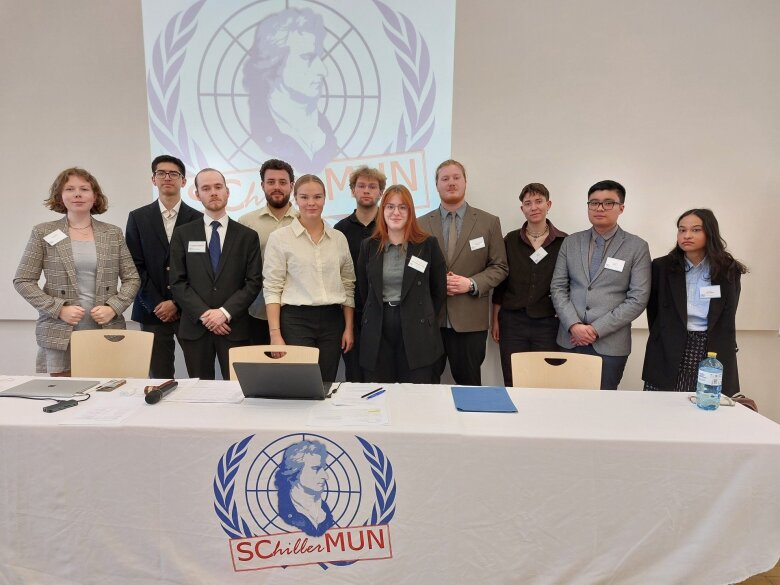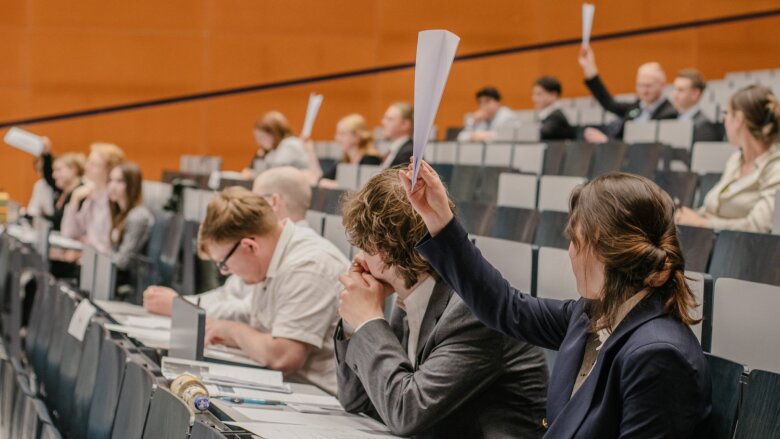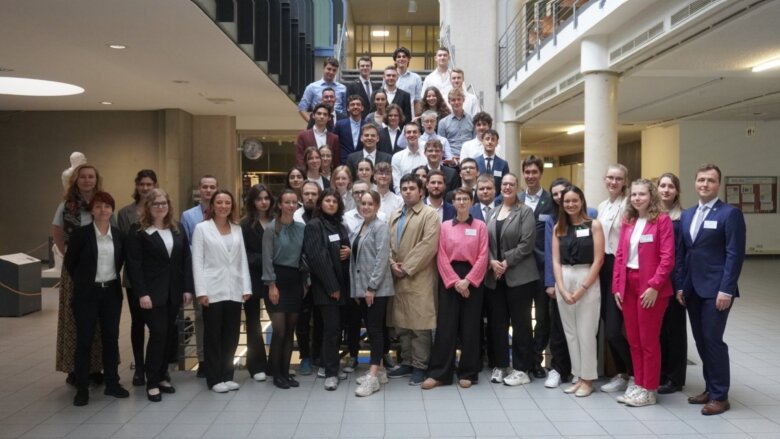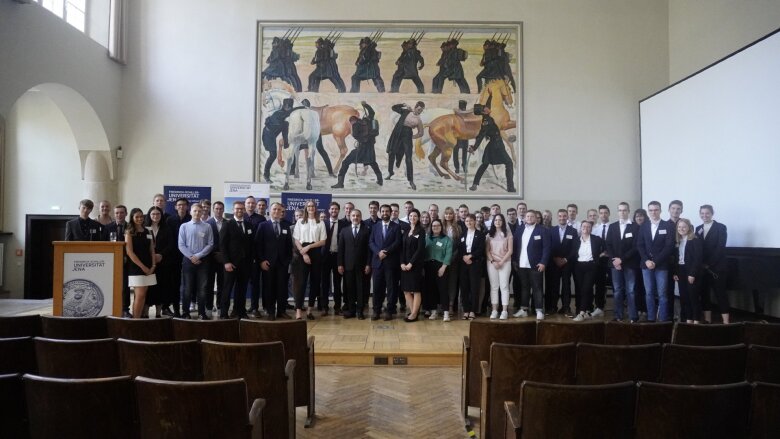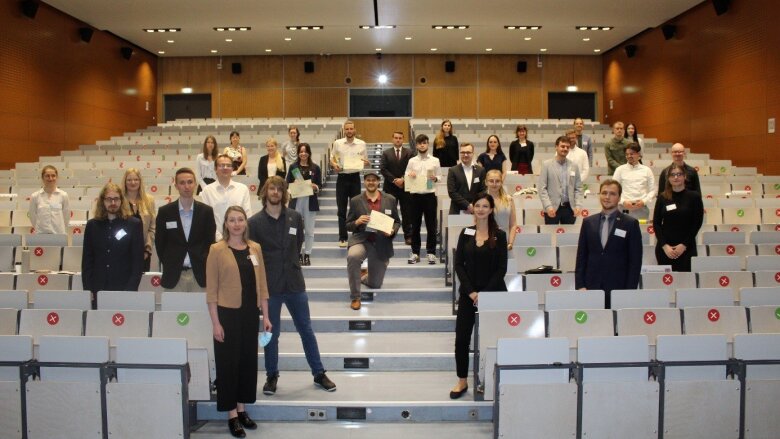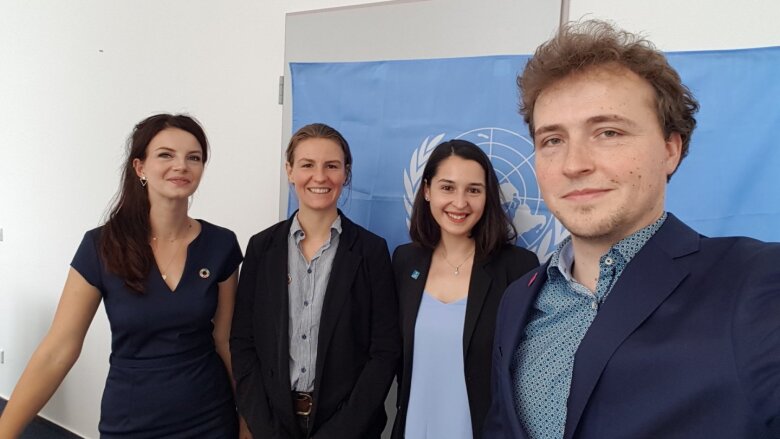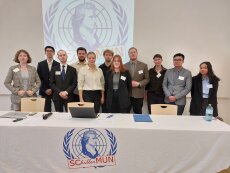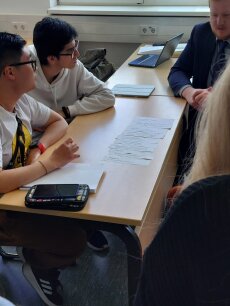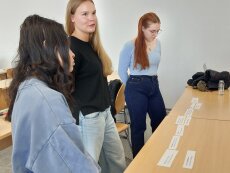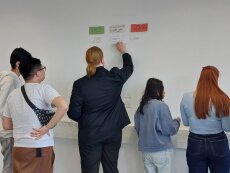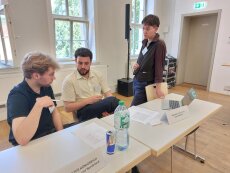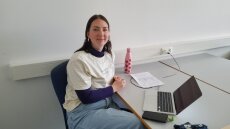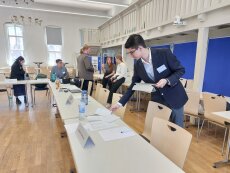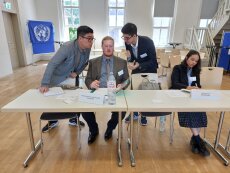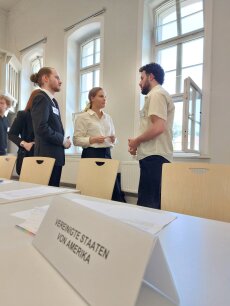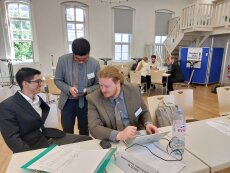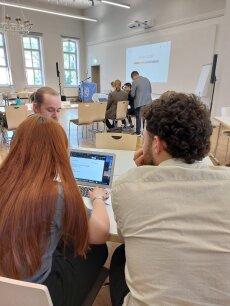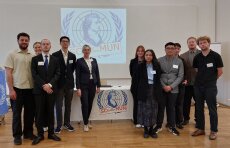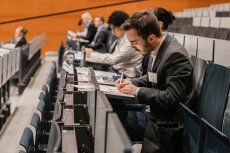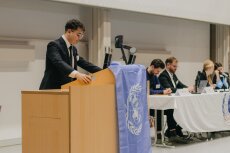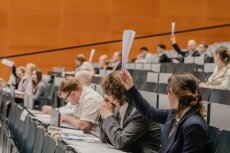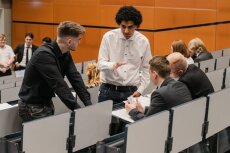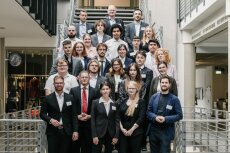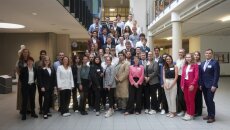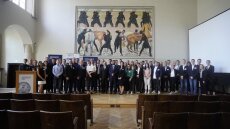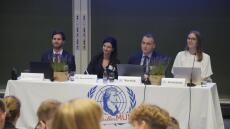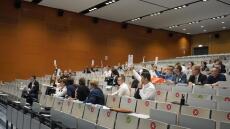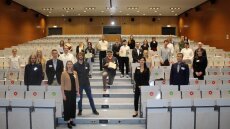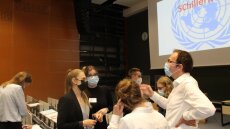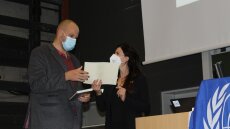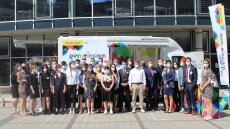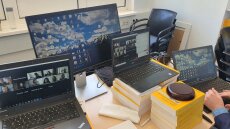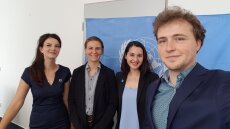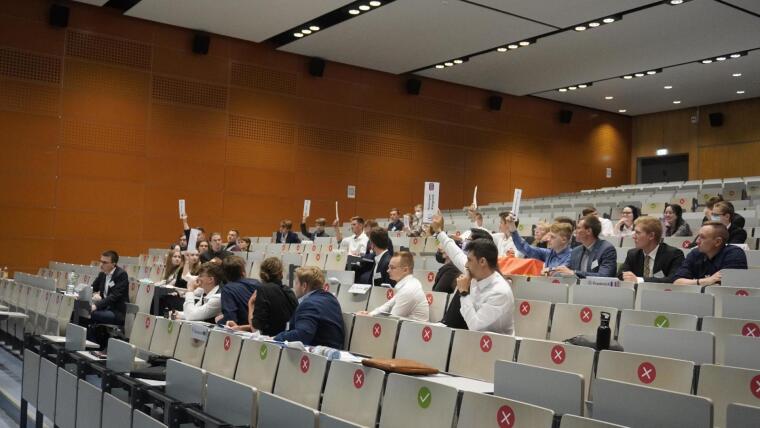
SChillerMUN is our simulation of the UN Security Council at Friedrich Schiller University Jena. It accompanies the lecture "International Organizations - Theoretical and Empirical Basics" (POL 260). The preparation takes place as a tutorial. In these sessions, students familiarize themselves with their states and learn about the processes within the UN Security Council and, in a simplified format, its rules of procedure, the topic of negotiations, negotiation strategies, and rules of political rhetoric. In the middle of June, the simulation will be realized as a compact course.
-
Report SchillerMUN 2025
In 2025, students at Friedrich Schiller University Jena once again took on the roles of diplomats in a simulation of the UN Security Council. On June 20 and 21, participants assumed the positions of the Council’s current members and gathered to deliberate on the conflict in Sudan. The little-publicized armed conflict has been raging for three years, causing a severe humanitarian crisis for many people in one of Africa’s largest countries.
In two preparatory block seminars led by Dr. Aletta Mondré and teaching assistants Luis Ballandt, Annika Lüttge, and Rieke Langel, the students prepared for the simulation. They conducted a structured conflict analysis of the situation in Sudan, informed themselves about conditions on the ground, and developed potential solutions. They also learned about the procedures of the UN Security Council, including its rules of procedure and the drafting of formal resolutions. Through practical exercises, participants delivered impromptu speeches, tested the persuasiveness of different types of arguments, and applied negotiation strategies. In addition, they researched the positions and interests of the states they represented in order to realistically simulate international negotiations.
On Friday, the first formal session of the simulation was opened, with delegates delivering their opening statements. Throughout the day, students explored common ground as well as diverging positions, drafting working papers that could later be developed into resolutions.
Saturday was dedicated largely to informal negotiations as delegates worked toward developing a unified Council position. As the day progressed, however, it became increasingly clear that the member states had split into two blocs with sharply differing views on the international community’s role in the Sudan conflict. In further speeches, delegates sought to persuade one another of their proposals and tested possible compromises. In the end, two draft resolutions were put to a vote. Neither the coalition advocating for regional mediation nor the proposal to establish humanitarian safe zones and a stabilization mission won majority support.
The simulation thus realistically reflected the differing geopolitical interests and the reluctance of member states to establish new peacekeeping missions. Participants demonstrated their extensive knowledge convincingly, while also putting newly acquired rhetorical skills into practice in a challenging negotiation setting. The award for Best Delegate went to Ben Keberle, who received a book prize donated by the Thalia university bookstore in Jena. SchillerMUN 2025 offered students the opportunity to gain firsthand experience of the complexity of international politics through an action-oriented and interactive format.
SChillerMUN 2025
Image: Aletta Mondré -
Report SChillerMUN 2024
On June 14-15, 2024, more than 20 students from Friedrich Schiller University Jena took on the roles of UN delegates and simulated a session of the UN Security Council in this year’s iteration of the SChillerMUN. The main focus was on drafting a resolution to combat international terrorism, addressing the global threat of terrorism. Pairs of students formed delegations representing the countries currently sitting on the Security Council.
To prepare for the simulation and the session, the students attended tutorials led by Nicole Fett and her team—Floriane Schnieders and Lucas Kozun—where they studied current trends, threats, and potential solutions related to international terrorism. By learning about the procedures of the UN Security Council, its rules of procedure, and acquiring skills in negotiation strategies and political speech writing and delivery, the students were able to create a realistic simulation.
Even before the simulation, the students took on their roles as representatives of their countries and worked on forming initial alliances, proposing solutions, and drafting working papers during informal meetings.
On Friday, June 14th, the first formal session of the simulation was officially opened with a speech by Secretary-General Nicole Fett, and the individual delegations were able to deliver their opening speeches. Throughout the day, the students diligently continued to work on their working papers and discussed solutions in further formal and informal sessions.
After the final draft resolutions were submitted, the following day was marked by bilateral and multilateral negotiations, discussions on amendments, short speeches, and the final vote on the draft resolutions. At precisely 6 p.m. on Saturday, June 15th, three resolutions were adopted by the committee, while one of the submitted draft resolutions failed due to a veto by the U.S. delegation.
At the end of the simulation, the Algerian delegation (consisting of Laurin Kienberger and Lena-Marie Martin) was awarded the Best Delegation Award and received a prize provided by the United Nations Association of Germany (DGVN). Additionally, all delegates and staff members had the opportunity to vote for the best individual performance among all the students. Luis Ballandt, representing Ecuador, was honored as the Best Delegate.
Through their participation in SchillerMUN, the students acquired valuable skills that go far beyond theoretical knowledge. They learned about the structures and processes of the UN Security Council, honed their analytical skills, and improved their rhetorical and diplomatic abilities in realistic negotiation situations. The simulation promoted teamwork, strategic thinking, and alliance-building. Overall, the MUN project offered the students a unique opportunity to apply their theoretical knowledge practically and develop important soft skills for their future careers.
Delegates at SChillerMUN 2024
Image: Nicole Fett -
Report SChillerMUN 2023
Learn more deSChillerMUN 2023 group picture
Image: Hannah Vanessa MeyerThe report for the 2023 iteration of SChillerMUN is available in German only.
-
Report SChillerMUN 2022
As every year, more than 50 students of the Friedrich Schiller University assumed the roles of UN delegates and simulated a meeting of the UN Security Council from June 17 to 18 2022. In the context of the humanitarian emergency in Afghanistan, the main focus was on the extension of the mandate of the United Nations Assistance Mission in Afghanistan (UNAMA). The delegations each comprised three or four students, representing the countries in the current composition of the Security Council.
In order to prepare for the simulation and meeting, the students studied Afghanistan, the current humanitarian situation there and the role, position and strategies of the countries to be represented in advance in tutorials led by Franziska Sandt and her team – consisting of Ina Siemer, Lucas Kozun, Hendrik Damerow, Hannah Meyer, Ana María Gutiérrez Suárez and Antonia Rausch. By studying the procedures of the UN Security Council, its rules of procedure, and learning stylistic devices for negotiation strategies and writing and delivering political speeches, the students were able to create a simulation that was as close to reality as possible.
At the opening ceremony, on Friday, June 17, Ms. Sandt and her team had the pleasure of welcoming His Excellency, Mr. Yama Yari, Ambassador Extraordinary and Plenipotentiary of the Islamic Republic of Afghanistan, and Mr. Abdul Baqi Popal, Envoy Counsellor of the Embassy of the Islamic Republic of Afghanistan, to the auditorium of the University's main building. The enduringly inspiring visit of the Jena delegation in preparation for the Harvard World Model United Nations 2022 to the Embassy of the Islamic Republic of Afghanistan in Berlin in March this year preceded this initiative.
His Excellency explained his history and view of the current situation in Afghanistan in an emotional and very relatable guest speech. This gave the students a unique view of the reality in Afghanistan with insights into the life of Afghan society and the illumination of various aspects of the crisis, which are often forgotten due to the frequently little differentiated view of our Western environment. The reactions of the ambassador to the questions raised by the 15 delegations of the SChillerMUN Security Council inspired the students in a lasting way and could influence their performance for the later course of the simulation in an exceptionally positive way. This emotional, critical and at the same time highly informative performance enabled the students to submit their working papers for a resolution proposal fully and based on intensive considerations.
On the same day, the first formal session of the simulation was officially and ceremoniously opened by a speech from the Secretary General (Franziska Sandt) and the individual delegations were able to deliver their opening speeches while negotiating partners were sought and new draft resolutions were written.
The following Saturday was then marked by many bilateral and multilateral negotiation meetings, discussions on amendments, short speeches, strategy games and the final vote on the draft resolution. At 6 p.m. sharp, Resolution 2410 was adopted with 14 votes in favor and one abstention by the Russian delegation.
At the end of the simulation, the delegation of the People's Republic of China (Georg Krimmler, Alexandra Kehm and Benjamin Kalis) was honored as the best delegation and received a prize provided by the Deutsche Gesellschaft der Vereinten Nationen (DGVN).
In addition, all delegates and staff were able to vote for the delegate for the best individual performance among all students. Gideon Wessel, who represented Brazil, received the award for best delegate and a book prize donated by the bookstore Thalia.
student resolutionpdf, 26 kb · de
SChillerMUN 2022 group picture
Image: Franziska Sandt -
Report SChillerMUN 2021
On th 18th and 19th of June, 30 students from the University of Jena slipped into the role of delegates from the member states of the UN Security Council and simulated a meeting of the international body on the Syria conflict. In particular, negotiations focused on the precarious humanitarian situation in Syria. The country distribution reflected the current composition of the Security Council and included country delegations from all parts of the globe. Two or three students were part of each delegation.
In the preparatory tutorials led by Franziska Sandt and her team (consisting of the tutors Antonia Rausch, Hendrik Damerow and Sven Meyer), the participants dealt with the procedures of the UN Security Council, the conflict in Syria, stylistic devices of political speech, negotiation strategies, and the respective state to be represented. This allowed for a most realistic simulation.
The innovative format of the course enables a deeper understanding of bilateral and multilateral negotiations as well as the complexities of world politics. At the end of the simulation, the delegation of Russia (Erza Plava, Raphael Piero and Leopold Henkler) received the best-delegation award and took away a small trophy provided by the German United Nations Association. In addition, Justus Bartlewski, representative of the United Kingdom, was elected as best delegate by all participants. He was awarded a book prize donated by the university bookstore Thalia.
student resolutionpdf, 23 kb · de
SChillerMUN2021_01
Image: Franziska Sandt -
Report SChillerMUN 2020
On the 19th and 20th of June, a creative team of tutors led by political scientist Franziska Sandt organized a completely digital MUN at Friedrich Schiller University Jena. As the name SChillerMUN already suggests, the meeting of the UN Security Council was simulated. The online simulation was the highlight of several weeks of preparation through an online tutorial, which was held in conjunction with the lecture "International Organizations - Theoretical and Empirical Basics" by Junior Professor Christian Kreuder-Sonnen.
When both the university administration and the student body of Friedrich Schiller University Jena had to adjust to a digital summer semester due to Covid-19, the SChillerMUN team also decided to go digital.
As part of the tutorial, participants were taught speaking and negotiating techniques, the working methods of the United Nations and, in particular, the UN Security Council. The theme of the SChillerMUN was the extension of humanitarian aid for Syria. The topic arose from Resolution 2504, which was passed as a compromise solution at short notice by the Security Council in January and would have expired in July.
A total of 38 students from various fields of study took part in the first SChillerMUN. In preparing for the simulation, students learned about the history, the actors and the current status of the Syrian conflict. The delegations familiarized themselves with the humanitarian situation in Syria, the border crossings for aid delivery and the extension of the resolution. They also acted as representatives of their respective states. Despite the challenges posed by the digital format of a simulation, students debated intensively over two days during our formal and informal sessions.
As a result of their negotiations, the draft resolution put forward by Germany was adopted with 12 votes for, none against and 2 abstentions (Russian Federation and People’s Republic of China).
student resolutionpdf, 131 kb · de
The innovative format of the courses enabled participants to gain a deeper understanding of the bilateral and multilateral negotiations as well as the complex global political contexts. The Delegation of Germany and the Delegation of the People's Republic of China received the SChillerMUN Award for their outstanding performances within the debate.
SChillerMUN2020_03
Image: Franziska Sandt
